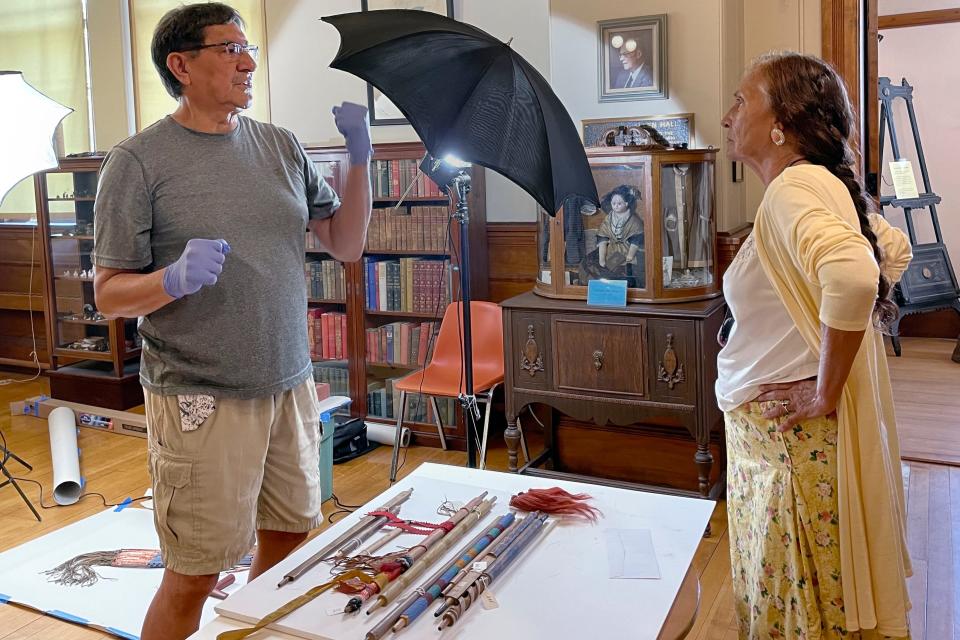Going home: Barre museum returns ancestral artifacts to Lakota tribes
BARRE — On Saturday, the Barre Museum Association officially returned the final pieces of a collection of tribal artifacts to representatives of the Lakota-Sioux tribes. For many watching, it was a historic event, but for the Lakota people, it represented more than history — for them it was a homecoming grounded very much in the present.
“These are not just artifacts,” Candi Brings Plenty of the Oglala-Lakota nation said, adding that for her people, the items that belonged to their ancestors represent a strong spiritual connection. “These are part of our relatives that are coming home."
More:'It's time for us to heal': Barre Museum Association will return Native American artifacts
For more than a century, over 131 items including clothing, weapons, arrows and moccasins, connected to the Wounded Knee Massacre, had been kept by the Founders Museum located at Barre’s Woods Memorial Library. On Saturday afternoon, representatives from Oglala, Standing Rock and Cheyenne River tribes formally accepted the repatriation of the artifacts. Tribal elders had been lobbying for their return for almost 30 years.
"It’s been a long journey," said Troy Phillips, chairman of the Massachusetts Commission of Native Affairs and member of the local Nipmuc tribe. "It was a private collection, so that made it a little tougher."
The library collection was gathered by Barre resident Frank Root, a 19th century traveling shoe salesman and part-time showman. Root, a contemporary and competitor of P.T. Barnum, collected artifacts on his travels including many from Wounded Knee, which he would then display as part of his show.
"This is a huge step towards a form of trauma healing…devastation and historical trauma that something as simple as relinquishing artifacts can heal generations."
Candi Brings Plenty of the Oglala-Lakota nation
Eventually, he donated his collection to the library and they have been there ever since becoming a fixture, which, which Ann Meilus, president of the museum association, suspects may have played a part in members of the community being reluctant to part with them.
"Most people remember seeing them on their fourth-grade tour," said Meilus. "So I understand the sentimentality but at the same time I think they’re just holding on to their childhood instead of helping to heal historical wounds."
Historical wounds that are felt to this day.
'Artifacts can heal generations'
"This is a huge step towards a form of trauma healing," said Brings Plenty. She said that it speaks to the level of, "devastation and historical trauma that something as simple as relinquishing artifacts can heal generations."
For Cedric Broken Nose of the Oglala, it was the culmination of work spanning four generations. The cause of returning artifacts to the tribe was passed down since the 90s through successive generations of tribal elders.

“This is a long time coming,” he said. “It’s a time of healing for us and rejoicing for the spirits so our youngsters won’t take on that responsibility.”
The artifacts will be taken back to tribal territory in South Dakota. There will be a year-long bereavement process, said Broken Nose, starting with the Dec. 29 anniversary of Wounded Knee. Afterwards, items will be returned to specific descendants when possible, but others will be placed in a memorial display.
Broken Nose hopes that Barre will set a precedent for similar cases across the country.

“This is a door-opener for all other museums and schools to give back belongings to the original tribes around the country,” he said. “This is just the beginning.”
That next generation is more than willing to continue the fight. Terrell Iron Shell’s family, also of the Oglala, who has lived in the Wounded Knee district since the 1800s, said Saturday’s event was a step in the right direction, but the fact remains the items shouldn’t have been taken in the first place.
“There’s no reason for any institution or person to have any of our artifacts or remains,” said Iron Shell. “The things that they have are the things we use to pray; the clothes, all have pieces of our spirit attached to them and we can’t have closure until we have them back.”
This article originally appeared on Telegram & Gazette: Barre returning Wounded Knee artifacts

